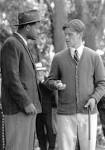“I Can’t Squeeze My Theme In!”
A couple of friends have written in:

Will Smith and Matt Damon in the movie of “The Legend of Bagger Vance”
“I know what my theme is, but I can’t figure out how to get it into my story.”
“How do I know which theme to pick?”
These are critical questions to answer because they both demonstrate a fundamental misunderstanding of what theme is and how it arises.
1) We don’t have to insert theme into our story. It’s in there already, whether we realize it or not.
2) We don’t pick your theme. Our theme picks us.
What do I mean by this? I mean a story—a novel, a play, a movie, a work of narrative nonfiction—is like a dream. Its source is our unconscious, our Muse. And just as in a dream, the totality arises organically and coheres naturally. The dream/story means something already. All we have to do as writers is figure it out.
(In many ways, this is the vital service our editors perform for us. Shawn has done it for me half a dozen times. He sees the theme that I’m blind to. He explains it to me. He tells me what I’ve already done but can’t see for myself.)
In other words, our theme is already there in the work. It’s built-in. Factory-installed.
Here’s a personal example:
The theme (or one of the themes) of The Legend of Bagger Vance is “the Authentic Swing.” Meaning a parallel and metaphor for the idea of the Authentic Self.
You and I are born not as blank slates but with a fully formed self, personality, and destiny. Our job in this life is to find that self and become it, to live it out.
That’s the theme of Bagger Vance. But I had no idea as I started the book—and even halfway through it—that this was the case. All I knew was that I was following my instincts. Characters arose, scenes appeared, a story began to take shape.
The theme was in there already.
One day as I was writing a scene, the phrase “the Authentic Swing” popped out. I knew at once that I had hit paydirt. “Ah,” I thought “this is what the story is about!”
A few weeks back we did a post titled “Analyze your story like a dream.” The idea was that Theme appears spontaneously in a story we write (as long as we’re truly following our instincts), just as meaning is embedded in a dream.
If you think about it, this is pretty amazing. We find ourselves “seized by” a story. We are compelled to write it. Why? Because on some soul-level known to our unconscious but not to us, the issue of this story is important to our evolution. Just as a dream will warn us of impending danger or encourage us or inspire us, so the novel/play/movie we find ourselves inspired to bring forth is also trying to speak to us.
What is it trying to tell us?
Its theme.
Its meaning.
Its significance.
Why is theme so hard to identify sometimes? Because every cell in our bodies (i.e., Resistance) has been laboring flat-out to keep us from seeing it. Why? Because when we see it, we will advance. Our consciousness will open. We will move one step closer to self-realization, to self-actualization.
This is why writing (or the pursuit of any art) is, to me, a spiritual enterprise. It’s an endeavor of the soul. The stories we write, if we’re working truly, are messages in a bottle from our Self to our self, from our Unconscious/Divine Ground/Muse to our struggling, fallible, everyday selves.
What is your story about?
Roll up your sleeves and do the work. Dig deep. Bust your brain. Figure it out.
I can declare with absolute honesty that every book I’ve written has unpeeled and revealed to me an aspect of my self that I had been unconscious of before I started writing the book. The philosophy behind the idea of the Authentic Swing: I had no idea I knew that, no idea I believed that. Yet I did. Completely. It is now the absolute bedrock of my view of life and death. Everything I do and believe is based on that.
I would never have known it if I hadn’t found it in my own story.
The artist’s journey is not so much about self-expression as it is about self-discovery.
That’s what theme is all about, from the writer’s point of view. It arises spontaneously in her work. It’s 100% true to her soul’s odyssey.
Another question that crops up regularly in correspondence is this: “What if I never find a publisher? What if I write book after book and no one ever even knows they’re out there? What’s the point?”
One answer (it’s a hardcore answer, I admit) is that on the deepest level it doesn’t matter if you and I ever crack Amazon’s Top 100 or hit the New York Times bestseller list. The works we produce are valid in their own right. They are telegrams to ourselves from our immortal, infallible, divinely-inspired souls.
The message is our story’s theme. We don’t have to insert it. We don’t have to invent it. It’s embedded in the work already. All we have to do is dig for it and figure it out.
 newest »
newest »
 Thanks for the inspiration. My day will come- with my tapestry of life will someday come the weave.
Thanks for the inspiration. My day will come- with my tapestry of life will someday come the weave.



